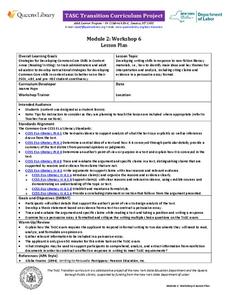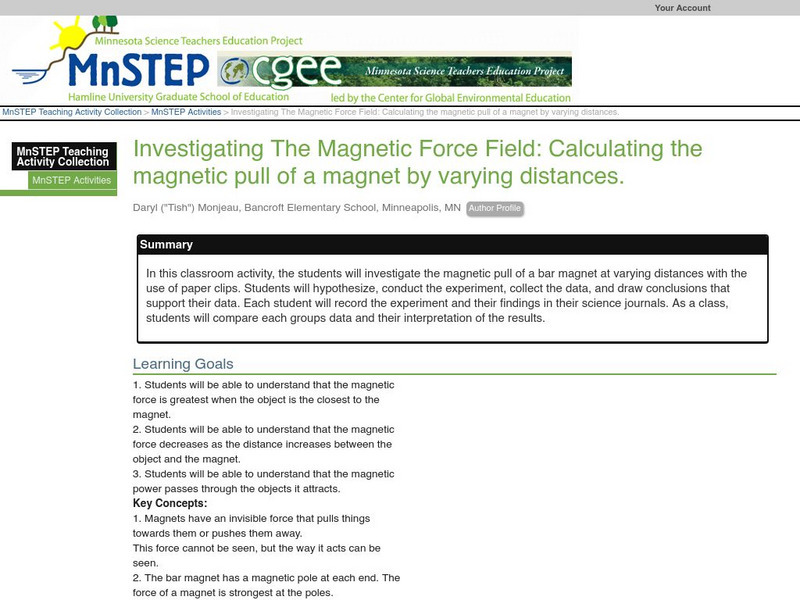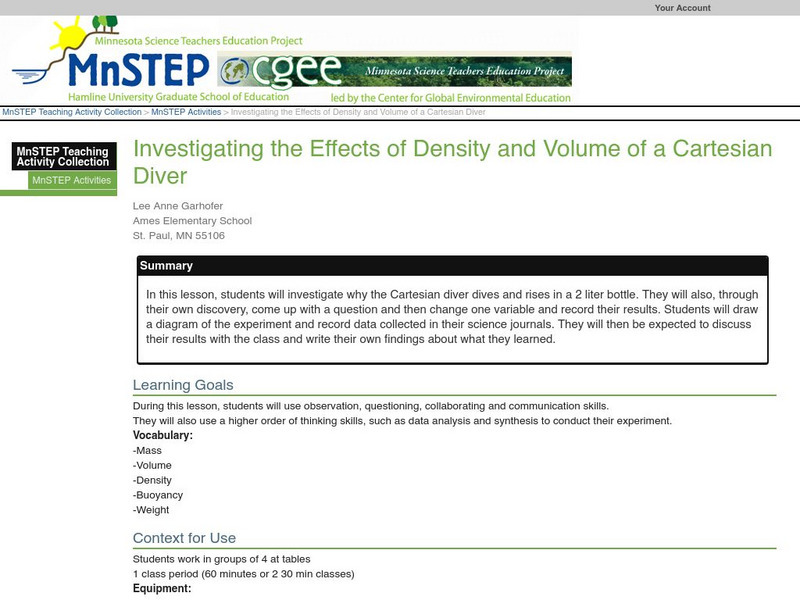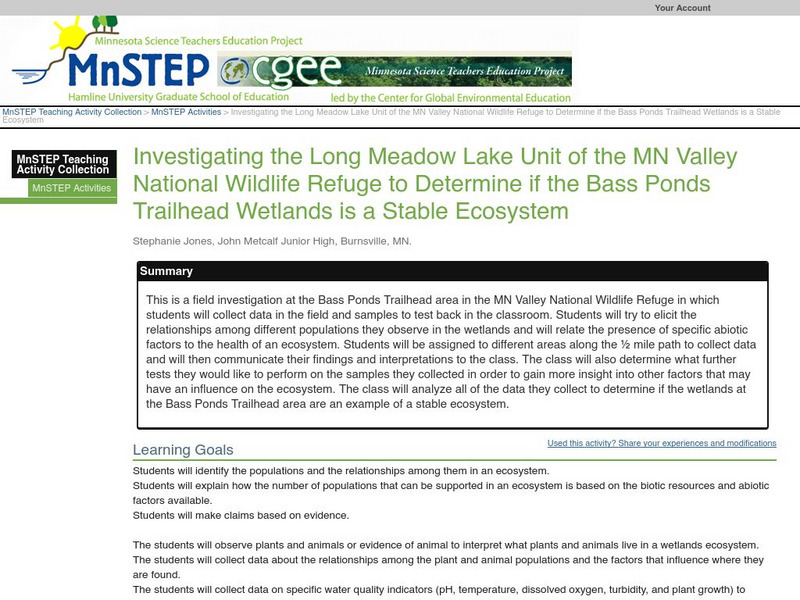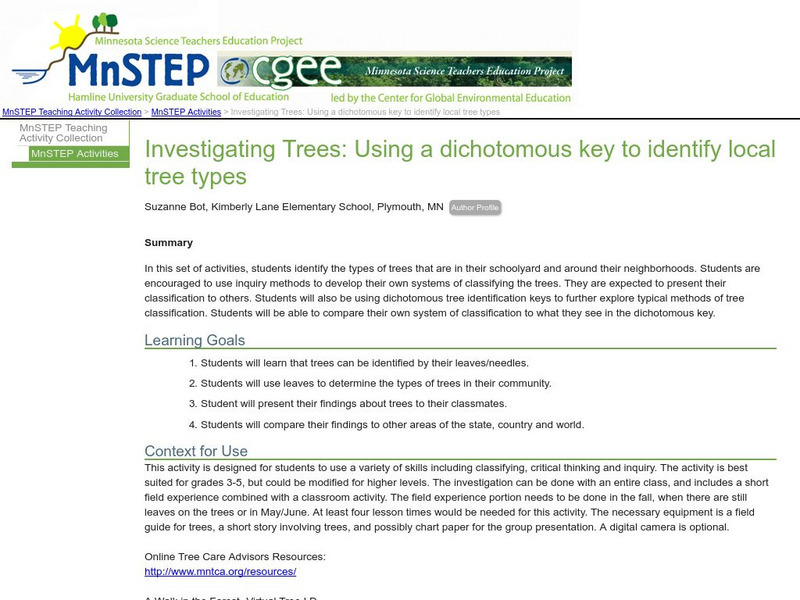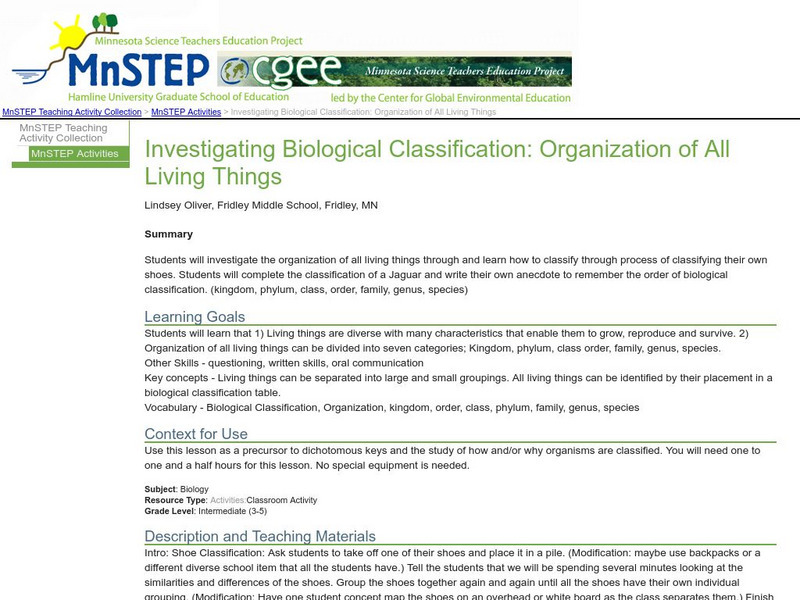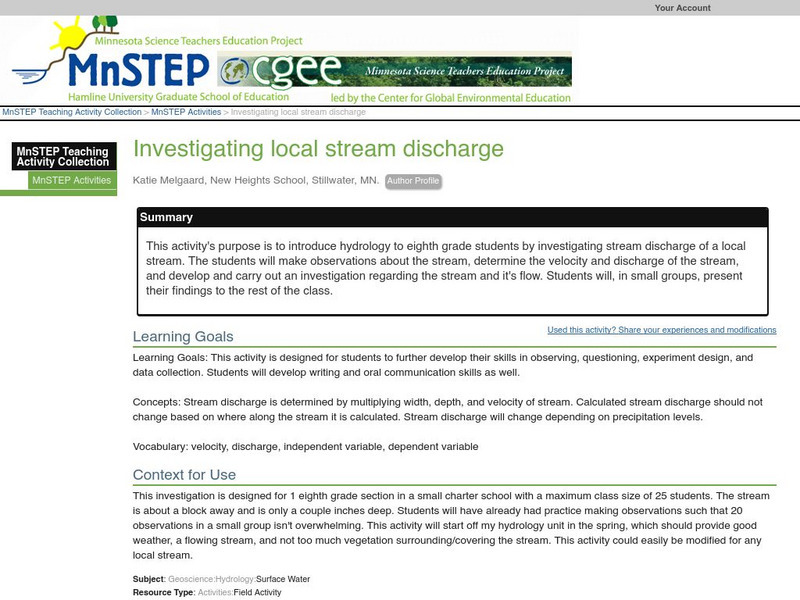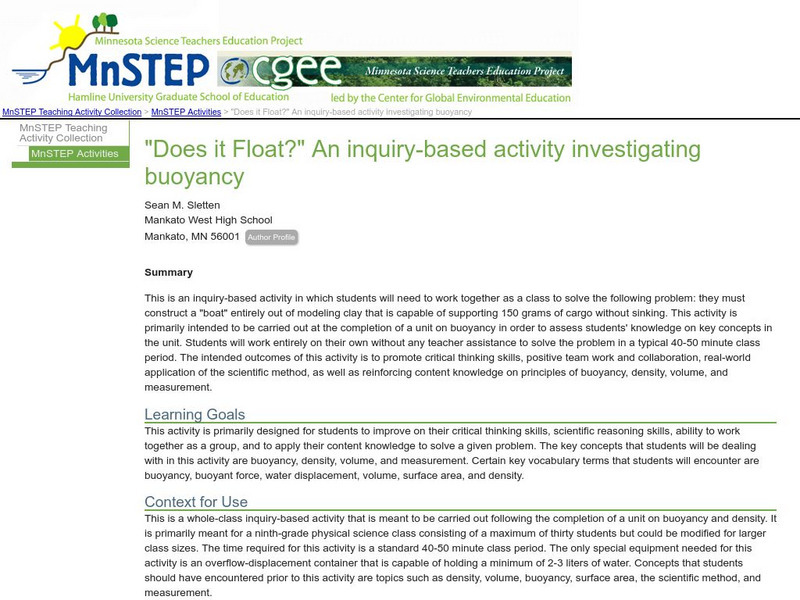EngageNY
TASC Transition Curriculum: Workshop 6
Is a college education necessary for success in today's world? The class investigates the question, along with others at the end of the sixth workshop in a 15-part series. The instructional activity has four parts with multiple...
College Board
AP® Psychology: Teaching Statistics and Research Methodology
Psychologists use statistics? Scholars investigate the research behind the methodology of statistical analysis. Using hands-on practice, case-studies, and scatterplots, they complete various tasks to understand the very roots of high...
New York State Education Department
TASC Transition Curriculum: Workshop 5
Are video games sports? Pupils investigate this question as well as various nonfiction selections to learn more about claims and the support that defines them. All of the selections mimic the rigor on state tests and encourage close...
American Psychological Association
Developing Adolescents
Why to young people act the way they do? Scholars investigate the stages of adolescent development incorporating high school psychology techniques. Using research from the American Psychological Association, they uncover the five areas...
Other
Alaska Sea Grant: Investigation 4 Human Impact Survey
Students examine and record data about the impact human activity has on a local aquatic environment in this teaching unit. They then analyze the information and develop a plan for improvement. The unit depends on being able to take the...
Science Education Resource Center at Carleton College
Serc: Investigating Trees
In this investigation, students will record an observation (drawing) of a tree in their science notebook. Following the observation, students will discuss what they observed and a list will be created by the classroom teacher. Based on...
Science Education Resource Center at Carleton College
Serc: Investigating Sound: Vibrations Are the Source of Sound
In this classroom activity, students will discover that when objects vibrate a sound is produced. Students will first observe different sound sources such as a music box, a sucker toy that has a stick coming out of it, etc. They will...
Science Education Resource Center at Carleton College
Serc: Investigating Ponds and Streams: How Clean Is Our Water?
In this field lab, students investigate the differences in three city ponds. Students will compare pond life, temperature, pH, Ammonia, dissolved oxygen, and Nitrate. The student use the pond sheets (Flinn Scientific Catalog 2007) to...
Science Education Resource Center at Carleton College
Serc: Investigating the Magnetic Force Field: Calculating Magnetic Pull
For this classroom activity, the students will investigate the magnetic pull of a bar magnet at varying distances with the use of paper clips. Students will hypothesize, conduct the experiment, collect the data, and draw conclusions that...
Science Education Resource Center at Carleton College
Serc: Investigating the Effects of Density and Volume of a Cartesian Diver
In this lesson, students will investigate why the Cartesian diver dives and rises in a 2 liter bottle. They will also, through their own discovery, come up with a question and then change one variable and record their results. Students...
Science Education Resource Center at Carleton College
Serc: Investigating the Long Meadow Lake Unit of Valley Nat'l Wildlife Refuge
This is a field investigation at the Bass Ponds Trailhead area in the MN Valley National Wildlife Refuge in which learners will collect data in the field and samples to test back in the classroom. Students will try to elicit the...
Science Education Resource Center at Carleton College
Serc: Investigating the Rock Cycle: Looking at Similarities and Diff in Rocks
In this activity students will be given three rocks representing the three main rock types in the rock cycle. They will make observations on those rocks and develop a hypothesis on how each rock formed. We will meet as a class and...
Science Education Resource Center at Carleton College
Serc: Investigating Trees: Using a Dichotomous Key to Identify Local Tree Types
Using their own classification methods students will identify the types of trees found around their school and neighborhoods. Students will then present their classification methods to the class. Later students will use dichotomous tree...
Science Education Resource Center at Carleton College
Serc: Leaf Investigation and Classification
Students will learn about classification of leaves by collecting a variety of leaves from home and working in small groups in the classroom to sort them into groups. Students will present their criteria for grouping the leaves to the class.
Utah Education Network
Uen: Dissolving Sugar Class Science Fair Project
Second graders work together as a class to generate a science fair project.
Science Education Resource Center at Carleton College
Serc: 2 Day Investigating Soil Samples: Observing and Identifying Soils
This description of this activity is a 2-day instructional activity: Day 1, Field Lab, Day 2, and Classroom Investigation. In this field lab, children working in groups will collect 3 samples of soil from different locations. Each sample...
Science Education Resource Center at Carleton College
Serc: Investigating Biological Classification: Organization of All Living Things
All living things can be identified by their placement in a biological classification table. Learners will investigate the organization of all living things and learn how to classify through the process of classifying their own shoes....
Science Education Resource Center at Carleton College
Serc: Investigating Precipitation: Snow
In this chemistry field/class based activity, students investigate snow and, more specifically, why snowflakes have six sides. Students will individually fossilize a snowflake and observe similarities and differences with other members...
Science Education Resource Center at Carleton College
Serc: Investigating How to Create a Stronger Electromagnet
In this lesson, students will investigate what they can do to produce a stronger electromagnet. Students will use the scientific thinking process to conduct investigations and build explanations. They will present their discoveries to...
Science Education Resource Center at Carleton College
Serc: Investigating Local Stream Discharge
This activity's purpose is to introduce hydrology to eighth grade students by investigating stream discharge of a local stream. The students will make observations about the stream, determine the velocity and discharge of the stream, and...
Science Education Resource Center at Carleton College
Serc: "Does It Float?" an Inquiry Based Activity Investigating Buoyancy
This is an inquiry-based activity in which students will need to work together as a class to solve the following problem: they must construct a "boat" entirely out of modeling clay that is capable of supporting 150 grams of cargo without...
Science Education Resource Center at Carleton College
Serc: Investigating Discovering What Plants Need for Photosynthesis
This activity will be used prior to any direct instruction for photosynthesis. In this inquiry lab, young scholars design and conduct simple experiments using elodea and Bromthymol blue to determine whether plants consume or release...
Science Education Resource Center at Carleton College
Serc: Mn Step: Water Retention No Problem With the Key Investigation
Students go outside to a nearby pond or wet area, and collect vertebrates and invertebrates. These are identified using a classification key. Information is recorded using a digital camera and a science notebook. Students later prepare a...
Science Education Resource Center at Carleton College
Serc: Investigating Speed and Velocity
In this investigation, young scholars will work in groups to design a model roller coaster, which will be used to clock the fastest speed for the rider (ball bearing/marble) The groups will build roller coaster models and modify and...
